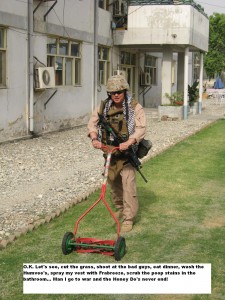Insights from an Army Officer
August 21st, 2013 Posted in The SandGram v1.01. The same people who approved “morality waivers” to make retention goals are now in charge and wondering why we have so many DUIs, Suicides, and Sex Assaults.
2. Seeking treatment for mental health issues is a long-term plan, you’re never “cured” and the DOD has absolutely no way to balance keeping the soldier in the force (trained/schooled/promoted) and getting him the treatment he needs.
3. We write policies telling our subordinates to do things that we will not do (cough *counseling subordinates* cough) and we don’t punish units for failing.
Case in point:
IG inspections. Generally, these don’t exist anymore. Subordinate units get “Staff Assistance Visits” to check that they are doing the things the higher staff is interested in, but not necessarily the way the Army says they will be done (for example, using DTMS to schedule training.)
If a unit has an SAV and fails it completely, the end result is that they will be reinspected, at a later date, to be determined. Usually, that later date is after the people on both staffs have moved on, so what was broken before is still broken. Lather, rinse, repeat. So for failing to pass inspection, a unit has no penalty… what is the motivation to apply resources to the problem to fix it?
We write policies outlining “good order and discipline” telling our soldiers how to behave, but we have no means within those policies to ensure they are being followed, and no penalty for not following the directives. We might, naturally, punish a soldier who does not uphold the standards published, but we don’t punish that soldier’s leaders for failing to influence them to behave within standards.
Platoon leaders don’t get an ass chewing if their platoons fail muster inspection, Platoon Sergeants don’t get shit-canned unless their personal behavior is outside the lines of good order and discipline, and only then if it’s for an egregious error like a DUI or raping the CG’s cat.
Company, Battalion, and Brigade commanders don’t get relieved for the failures of their units, they are the cream of the crop in terms of Army officers, (supposedly) and so of course these things can’t be indicative of lax standards of discipline on their part. We chase shadows trying to figure out why we have major and minor discipline problems spreading through our formations like a cancer (or more appropriately, like syphilis) when the answer is plain to the casual observer: we have these problems at the rate we have now because we tolerate them. We tolerate the command climates that permit these things to happen. We don’t look at undisciplined soldiers as a leadership failure, we see it as an individual soldier problem. We do not look at leaders and hold them responsible for the actions of their troops.
When was the last time the CG walked through the barracks, at night, on a weekend, and asked troops “when is the last time your battalion and brigade commander came through here after hours to check on you?”
I guaran-damned-tee you if it happened once, there would be brigade, battalion, and company level leaders in the barracks every weekend. Even better, what if he straight relieved the company commander/1SG of the barracks he was most displeased with, and reprimanded the Battalion commander?
What if the CG found PFC Ghettoblaster at the PX with his pants around his ass, hat on backwards, etc. (violating appropriate dress policy) and held him there until his chain of command arrived, and the CG held the Team leader, Squad leader, and Platoon Leader, Platoon Sergeant, and 1SG responsible for PFC Ghettoblaster’s failure to understand and adhere to the standard? What if he posted them at the PX until they were relieved by the chain of command of the next PFC Ghettoblaster found in the PX? Bet there’s be a lot less underwear showing at the PX. (And yes, this would work if the person violating the policy was a dependent, too. The only modification being the chain of command explaining why their soldier hasn’t explained the standards of dress to his dependents.)
I’m not suggesting that an O8 spend his days making uniform corrections at the PX, or walking through the Barracks every weekend. The CG only needs to do these things once–that’s all the influence he needs to apply to the problem to reinforce that it is important to him–and will energize his subordinate commanders to fix the problem.
Apply this methodology to “fixing” the sex assault problem in the Army:
CG gathers BN and BDE commanders–again, the theoretical cream of the crop–and tells them “this division has a problem with sexual assault. The next sexual assault that happens, I will relieve the chain of command from battalion down to fire team. What are your recommendations to fix the problem?” They might come up with some hair-brained ideas, but they may just hit upon a decent solution–now that they have skin in the game.
We don’t relieve leaders except for their personal failings–we no longer hold them accountable for the failures of their units. There is no multiple wave relief, either, for exceptionally bad failings, we might relieve one leader (usually a Captain or LT) but a LTC? Not happening. A COL? nope.
And that, in a nutshell, is the problem.
Tags: army, insights, problems, today's US Army





